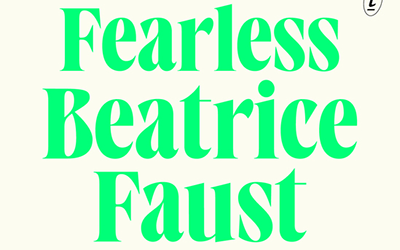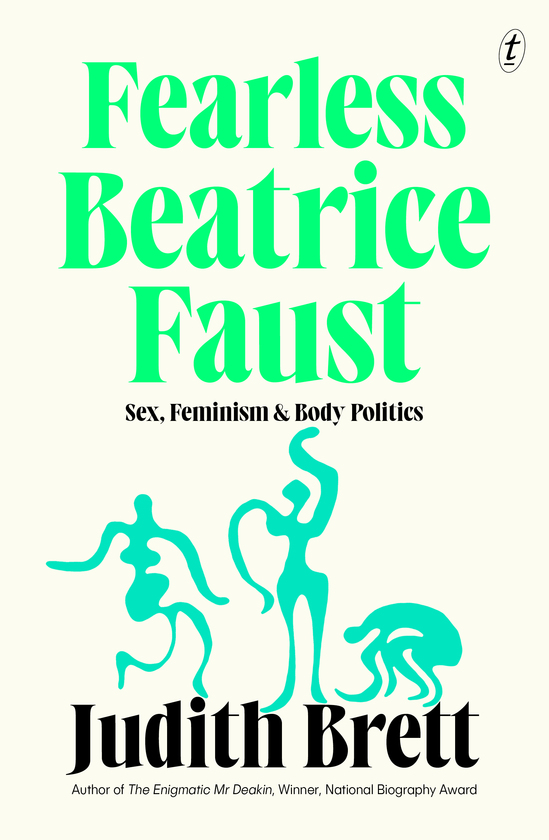
- Free Article: No
- Contents Category: Biography
- Review Article: Yes
- Article Title: Swimming against the tide
- Article Subtitle: A fine biography of a controversial activist
- Online Only: No
- Custom Highlight Text:
‘Bea never swam with the tide’, observes Judith Brett in her eloquent biography of the social reformer, activist, and public intellectual Beatrice Faust. Brett takes us behind the public face of this confident, outspoken, and strident political figure, whose name became synonymous with second wave feminism in Australia. The psychological reading of Faust that Brett offers, in a refreshingly analytical approach provides depth, complexity, and insight which makes this beautifully written book compelling to read.
- Featured Image (400px * 250px):

- Alt Tag (Featured Image): Joy Damousi reviews ‘Fearless Beatrice Faust: Sex, feminism and body politics’ by Judith Brett
- Book 1 Title: Fearless Beatrice Faust
- Book 1 Subtitle: Sex, feminism and body politics
- Book 1 Biblio: Text Publishing, $36.99 pb, 320 pp
- Book 1 Cover Small (400 x 600):

- Book 1 Cover (800 x 1200):

- Book 1 Readings Link: https://www.readings.com.au/product/9781923058316/fearless-beatrice-faust--judith-brett--2025--9781923058316#rac:jokjjzr6ly9m
Gaining access to diaries and letters, Brett presents a moving and emotional account of Faust’s personal and public life. But in Brett’s deft hands the narrative and analysis never falls into sentimentality. Brett resists easy categorisation and labelling of this complex and complicated figure. Brett is empathetic and compassionate towards her subject, but resists taking the path of hagiography. In depicting the intellectual and political milieu of the 1960s and 1970s, she refuses to judge those times in hindsight. Brett provides a highly nuanced understanding of Faust and her times, where biography becomes a rich intellectual, political, and psychological history.
Brett opens with the statement that Faust’s politics were driven by her body, its needs and pleasures, and the body of her mother. Faust’s body politics, Brett argues, were shaped by her own physical ailments, and the impact of her mother’s anxiety and her familial situation. How does Brett make this case? Beautrice Faust (née Fennessey) was born in 1939, in tragic circumstances: her mother, Bevy, died twelve hours after she was born. A Catholic, Bevy had refused to terminate her pregnancy when she was advised to do so. This dramatic beginning is Brett’s starting point for navigating Faust’s biography. The death of her mother, explains Brett, was the ‘defining fact of Beatrice’s life’. It left her craving love; her physical inflictions Faust believed were the result of her mother’s anxiety when she was in the womb. Faust thought her father, Fin, blamed her for his wife’s death.
These inauspicious beginnings were compounded by her physical ailments as a sickly child suffering from congenital asthma and bronchiectasis. Faust was deaf for the first six years of her life and was cruelly treated, as if she had a mental defect. When Faust’s main carer, Emma, her grandmother, died when Beatrice was two, Faust was left neglected and unloved.
Brett also raises the possibility of sexual abuse. Although there was no specific incident, one of her uncles would tie her up, resulting later in bondage fantasies; other times a drunken family friend tongue-kissed her, which she associated with being ‘dirty’. Faust suffered panic attacks. She could be overwhelmed by internal fear and crippling self-doubt. Before language, Brett reminds us, the body speaks, the body remembers. Later, as an adult, Faust’s was unusually open and explicit in her discussion about sexuality. She talked about how she had orgasms from the age of three; she spoke incessantly about her sexual exploits; she believed she experienced sex as men do – as an initiator, by separating emotional from physical experience. Brett weaves the psychology of her upbringing gently and persuasively into understanding her adult life.
The liberation from her loveless family was Faust’s education at Mac.Robertson Girls’ High School. Here, her fierce intelligence was rewarded. Gaining confidence, she matriculated and entered the University of Melbourne. Universities in the 1950s were male dominated and appallingly sexist, but they did open a world of ideas and debate in which Faust thrived. They also provided opportunities for sex. Soon Beatrice married Clive Faust, but separated within a year. She travelled overseas and met her second husband, Adam Murtonen. Academically, her career did not go as planned. With no patron and falling between ideological fault lines, her studies did not eventuate as she had hoped. Her reputation as a ‘sexual adventurer’ in the sexist academic world, as well as the perception of her as ‘unstable’, worked against her. While she was unable to pursue an academic career in literature, she was able to enrol in the Law school in a PhD on criminal law and abortion. After her son Stephen was born in 1965, she found mothering difficult; it was no surprise, Brett notes, given her own lack of maternal love. Faust became suicidal over this time and eventually left Murtonen.
It was abortion that propelled Faust into high-profile political activism. Her first article on abortion was published in 1963 in Melbourne University Magazine. Abortion, she wrote, was a public secret. Abortions were a source of great shame and distress. With the research from her PhD, and her own experiences and those of her mother, she became an abortion reform advocate through the newly formed Victorian Council for Civil Liberties of which she became president. Most people did not talk about abortion in public. Not so Faust.
Soon Faust became the public face of a campaign to decriminalise abortion. Faust co-founded the Women’s Electoral Lobby (WEL) in 1972 to interview politicians on a range of topics related to women’s issues. Coupled with her presidency of the Abortion Law Reform Association, Faust became central to advocating political reform. But as Brett shows, not all feminists agreed with her reform agenda. The new wave of women liberationists who demanded more far-reaching and radical change were a generation apart; Faust was shouted down at women’s liberation meetings. As the counterculture movement swept feminism, these differences widened. Faust believed biology is destiny, a view that was out of favour with the baby boomer radicals who interpreted culture and power as central to feminist analysis. Faust enjoyed sex and wrote about sexual pleasure but not always through power. Brett astutely notes that Faust often preferred to work with men and was not always at ease with the sisterhood. Personally, her chronic physical pain persisted, leading to addiction to medications.
The book ends in the 1990s, when Faust wrote several works: Apprenticeship in Liberty (1991), Benzo Junkie: More than a case history (1993), and Backlash? Balderdash! Where feminism is going right (1994). In the 1990s, a different form of feminism emerged in the work of Susan Faludi and Naomi Woolf. Faust felt distant from the younger generation. She supported Helen Garner in her position in The First Stone (1995) and was outraged that young women would go to the police to report what she considered to be an innocent sexual advance. There is a seamless coherence to the book as it chronicles Faust’s life, but her later years are not the focus of it. Faust died in 2019, aged eighty. Where was her rebellious energy, her outspoken personality channelled in the past two decades of her life? Brett concludes that Faust was more effective as an activist and agitator, not as a theorist or writer. Once she vacated that platform, she completely retreated from public life, but what then preoccupied this forthright woman of formidable intellect?
Brett describes Faust as brave in overcoming her fragilities – both physical and psychological – to fight for women’s rights. This, too, is a brave book. It explores with fearless interpretative and explanatory power how and why Faust made the choices she did and what drove the political activism of a remarkable pioneer and trailblazer. It is biography at its best.


Comments powered by CComment